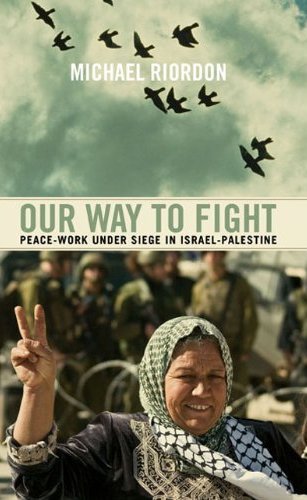Few conflicts provoke such a visceral reaction as Israel-Palestine, that land held hostage by narrow media images of constant chaos and violence. While bookshelves are well-stocked with political and historical analysis, a growing body of literature broadcasts grassroots voices struggling with the dynamics of daily life in this deeply divided society.
A strong entry in the latter category is Michael Riordan’s Our Way to Fight, a compelling compendium of first-hand accounts from both sides of a great divide that chronicles modest yet meaningful reconciliation efforts. In this war zone, life remarkably goes on, and Riordan illustrates how everyday people — doctors, lawyers, archeologists, theatre producers, teachers, community organizers, farmers — refuse what they call the “luxury of despair” and continue chipping away at the physical and psychological barriers that prevent peaceful co-existence.
Refraining from partisan bashing, he creates space for the words and feelings of women who monitor abuses at Israeli military checkpoints, historians trying to preserve original place names in areas bulldozed for illegal settlements, young people jailed for refusing the Israeli military’s call-up, and artists helping young people channel their rage into creative outlets.
Each chapter focuses on a project and group of individuals who have chosen to carve out their special niche of peaceful protest and social change, detailing their personal histories and how they came to speak and act out against the Israeli occupation. What is remarkable about the stories is the consistency of their narrative arc: in such a segregated country, most Palestinians and Israelis rarely encounter one another, and it is only when that personal connection is made that eyes open, viewpoints broaden, and commitments to change are undertaken.
Even readers unfamiliar with the basics of this inflammatory issue will find Our Way to Fight an accessible read, as Riordan weaves together many strands in a manner that apes the best of political organizing: these feel like dialogues across kitchen tables and during smoke breaks. He also does a terrific job portraying the ambiguity, the constant questioning and expressions of self-doubt, of those who tarry forth against seemingly impossible odds: do these good works serve to humanize the rougher edges of occupation, or do they represent genuine human progress?
Riordan’s portrayal of hope in a time of trouble is subtly contagious and, ultimately, inspiring, reminding us that getting involved is no magic trick, but rather a very human response to the conflicts that present us with moral choices every day.—Matthew Behrens
This review first appeared in the April issue of Quill & Quire.
Matthew Behrens is a freelance writer and coordinator of Homes not Bombs.



